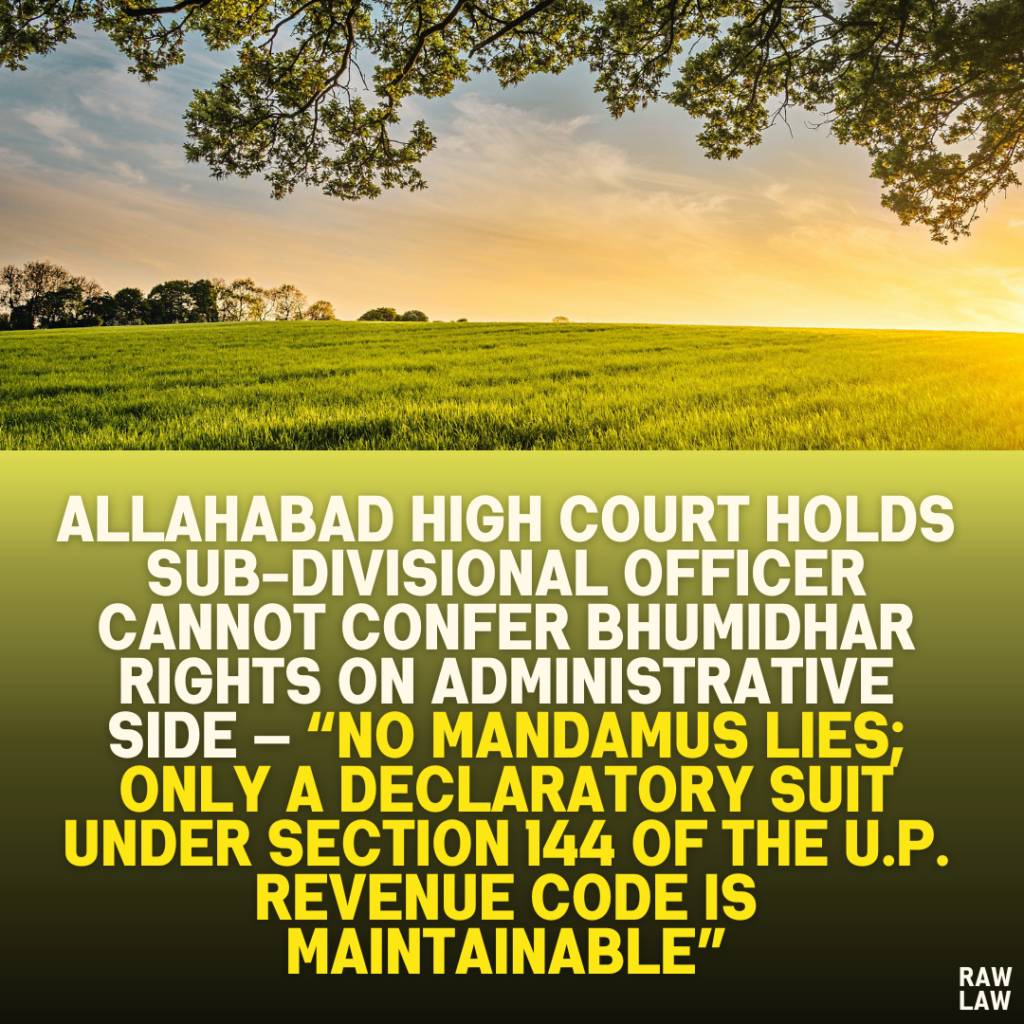Court’s Decision
The Allahabad High Court dismissed a writ petition seeking a mandamus to direct the Sub-Divisional Officer to grant Bhumidhar with transferable rights under Sections 131A and 131B of the U.P. Zamindari Abolition and Land Reforms Act, 1950 and Section 76 of the U.P. Revenue Code, 2006. The Court held:
“Sub-Divisional Officer has no jurisdiction to grant such a declaration on administrative side, however, he is certainly competent to grant such a declaration in appropriate statutory proceedings under Section 144 of the Code, 2006.”
It further held that a writ of mandamus cannot be issued where there is no statutory duty imposed on the officer:
“Mandamus cannot be issued unless the pre-conditions are satisfied. Such well-defined conditions are not satisfied in the present case.”
Facts
The petitioner claimed to have acquired the status of a Bhumidhar with transferable rights pursuant to previous lease proceedings. Relying on Sections 131A and 131B of the U.P. Zamindari Abolition and Land Reforms Act, 1950 and Section 76 of the U.P. Revenue Code, 2006, he asserted that after five years of holding non-transferable rights, he was entitled to be declared a Bhumidhar with transferable rights. The petitioner submitted representations dated 07.05.2022 and 15.06.2024 to the Sub-Divisional Officer but sought court intervention when no declaration was granted.
Issues
- Whether the Sub-Divisional Officer has administrative authority to declare a person as a Bhumidhar with transferable rights under the Act of 1950 and the Code of 2006.
- Whether a writ of mandamus can be issued to compel the Sub-Divisional Officer to grant such declaration.
Petitioner’s Arguments
- The petitioner argued that by virtue of being in continuous possession and having acquired non-transferable rights under Section 131A of the 1950 Act, he should automatically be treated as a Bhumidhar with transferable rights under Section 131B and Section 76 of the 2006 Code.
- It was submitted that since more than five years had elapsed since acquiring non-transferable rights, the Sub-Divisional Officer was legally bound to declare transferable rights in his favour.
Respondent’s Arguments
The Court considered the legal framework and held that none of the statutory provisions empowered the Sub-Divisional Officer to grant such declarations on the administrative side, and hence no statutory obligation existed that could support the issuance of a writ of mandamus.
Analysis of the Law
The Court closely examined:
- Section 131A of the 1950 Act, which deems persons in cultivatory possession before 30.06.1978 to have become Bhumidhar with non-transferable rights.
- Section 131B of the 1950 Act, which provides that a Bhumidhar with non-transferable rights becomes one with transferable rights after ten years.
- Section 76 of the 2006 Code, which shortens this period to five years and applies similar provisions for persons who had non-transferable rights immediately before the Code’s commencement.
- The Court found that these provisions contemplate automatic accrual of status, but do not designate any officer, including the Sub-Divisional Officer, as the authority to issue such declarations administratively.
Further, Section 144 of the 2006 Code was identified as the appropriate remedy for seeking such declarations, which requires a formal suit to be instituted in a court where the State and Gram Panchayat are necessary parties.
Precedent Analysis
The Court relied on the Supreme Court’s ruling in:
- Oriental Bank of Commerce v. Sunder Lal Jain (2008) 2 SCC 280, where it was held that: “A writ of mandamus can be granted only where there is a statutory duty imposed upon the officer concerned and there is a failure on the part of that officer to discharge the statutory obligation.”
This principle was reaffirmed by reference to earlier decisions in:
- Bihar Eastern Gangetic Fisherman Co-operative Society Ltd. v. Sipahi Singh (1977) 4 SCC 145
- Lekhraj Sathramdas Lalvani v. N.M. Shah, AIR 1966 SC 334
- Dr. Uma Kant Saran v. State of Bihar (1993) 1 SCC 485
These cases consistently held that mandamus cannot be granted to enforce non-statutory obligations.
Court’s Reasoning
The Court reasoned that although the petitioner may substantively qualify for the status of Bhumidhar with transferable rights under the applicable legal provisions, the mode of enforcement of such a right must conform to the statutory procedure.
“Such an aspect needs adjudication by the Sub-Divisional Officer in appropriate suit proceedings under Section 144… and not on administrative side on a bare application.”
Since Section 144 provides for declaratory suits for tenure rights, and specifies the necessary parties (State and Gram Panchayat), the remedy lies therein—not through executive fiat or administrative processing.
Conclusion
The writ petition was dismissed. The High Court granted the petitioner liberty to seek declaration through an appropriate suit under Section 144 of the U.P. Revenue Code, 2006.
Implications
- Administrative officers, including Sub-Divisional Officers, cannot grant tenure rights such as Bhumidhari status on the administrative side, even if the claimant satisfies substantive legal criteria.
- Tenure disputes or declarations under the U.P. Revenue Code must be adjudicated through formal declaratory suits, thus reinforcing the separation between administrative and judicial/quasi-judicial functions.
- Petitioners must resort to Section 144 proceedings to establish their rights, and mere representations or writ petitions based on accrued rights without statutory adjudication are insufficient.



